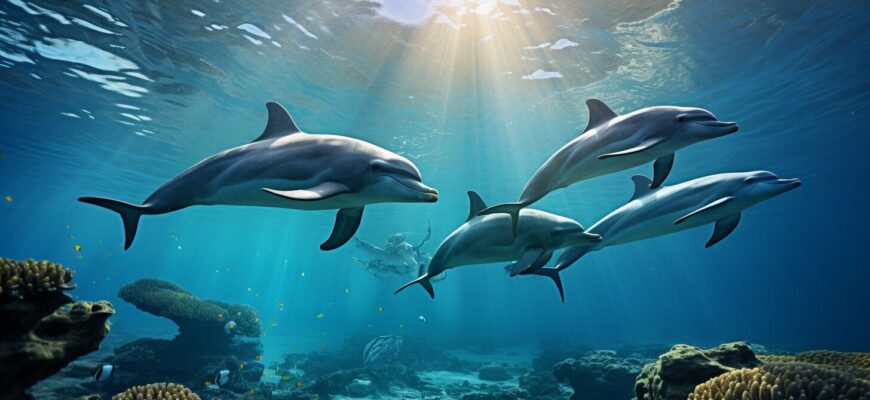Have you ever wondered if it’s possible to eat dolphins? Surprisingly, this question has been asked more often than you might think. In some cultures, dolphins have been considered a delicacy for centuries. However, the idea of consuming these intelligent and friendly creatures has also sparked controversy and ethical debates.
So, what’s the answer? Can you eat dolphins? Let’s explore this topic in detail and uncover some curious facts about dolphins as food.
- Dolphins as Food: A Historical Perspective
- Dolphins as Food: Traditional Dishes
- The Ethics of Eating Dolphins
- The Cultural Perspective
- The Animal Rights Perspective
- The Environmental Perspective
- Laws and Regulations Surrounding Dolphin Consumption
- Nutritional Value of Dolphins
- Nutritional Content of Dolphins
- Health Benefits and Risks
- Cultural Significance of Dolphins
- The Cultural Significance of Dolphins in Hawaii
- Environmental Impact of Eating Dolphins
- Alternatives to Eating Dolphins
- Seafood
- Plant-Based Proteins
- The Health Risks Associated with Dolphin Consumption
- Cultural Conservation Efforts for Dolphins
- Conservation Organizations
- Anti-Captivity Movements
- Marine Protected Areas
- Frequently Asked Questions about Eating Dolphins
- Are dolphins commonly consumed as food?
- Is it legal to eat dolphins?
- What are the health risks of eating dolphins?
- Can dolphin meat be substituted with other types of seafood?
- Why is it important to protect dolphins?
- Are there any organizations or initiatives working to protect dolphins?
Dolphins as Food: A Historical Perspective
Eating dolphins is not a new phenomenon and has existed for centuries in different cultures. In ancient Greece, dolphins were considered sacred and were often depicted in art and sculptures. However, the Greeks also hunted and ate dolphins, viewing them as a delicacy reserved for the wealthy.
On the other side of the world, the Maori people of New Zealand hunted and consumed dolphins as a traditional part of their diet. They believed that dolphins were a gift from the sea and had special powers that could protect them from harm.
Dolphins as Food: Traditional Dishes
Many traditional dishes from different cultures involve the use of dolphin meat. In Japan, for example, dolphin meat is considered a delicacy and is served in various ways such as sashimi and grilled. In the Solomon Islands, a dish called “dolphin curry” is made using dolphin meat, coconut milk, and spices.
| Culture | Traditional Dish |
|---|---|
| Japan | Sashimi, grilled dolphin meat |
| Solomon Islands | Dolphin Curry: made with dolphin meat, coconut milk, and spices |
While these dishes are considered part of the cultural heritage of certain societies, they have also been met with criticism and controversy in recent times.
The Ethics of Eating Dolphins
Consuming dolphins has been a controversial topic in various cultures, with ethical considerations taking center stage. While some view it as a cultural tradition, others see it as a cruel act that violates animal rights.
The consumption of dolphins is prevalent in certain areas of the world, especially in Japan, where it is considered a delicacy. However, the annual dolphin hunt in Taiji, Japan, has faced severe criticism from animal rights activists who describe it as barbaric.
On the other hand, some cultures view dolphins as a source of nutrition and a traditional food source. Some Pacific Islanders, for example, have been hunting dolphins for centuries as part of their cultural heritage.
The debate on whether it is ethical to eat dolphins remains unresolved, with different cultural perspectives and beliefs coming into play. However, it is evident that the issue is sensitive and requires careful consideration from all parties involved.
The Cultural Perspective
In some cultures, eating dolphins is seen as a sign of respect and honor. For example, the consumption of dolphins during special occasions is considered a sign of wealth or social status among some Pacific Islanders.
Similarly, in Japan, consuming dolphins is linked to their culture and the belief that it is a valuable source of protein. However, critics argue that cultural traditions should not justify the harm caused to sentient beings.
The Animal Rights Perspective
Opponents of dolphin consumption view it as a form of animal cruelty. The hunting and slaughtering of dolphins involve gruesome methods such as harpooning, which can lead to prolonged suffering for the animals.
Dolphins are also highly intelligent and social creatures that are known to form strong emotional bonds with one another. Those against dolphin consumption argue that killing them for food is akin to killing a human being.
Furthermore, dolphins are considered endangered species in some parts of the world, and their hunting can lead to population decline and extinction.
The Environmental Perspective
Another aspect to consider is the environmental impact of consuming dolphins. Overfishing and hunting of marine animals such as dolphins can disrupt the marine ecosystem and lead to imbalances.
Because dolphins are apex predators, their consumption can affect the populations of their prey and cause a ripple effect on the marine food chain. This can lead to a decline in fish stocks, affecting the livelihoods of fishing communities.
Overall, the ethics of consuming dolphins are complex, with different perspectives and considerations to take into account. It is essential to have a balanced and informed approach to the issue, taking into account cultural, animal rights, and environmental perspectives.
Laws and Regulations Surrounding Dolphin Consumption
The consumption of dolphins is a controversial topic, and many countries have enacted laws and regulations to protect these intelligent marine mammals. In some countries, such as Japan and the Solomon Islands, dolphin hunting and consumption are legal and cultural traditions that date back centuries. However, in other countries, including the United States, Brazil, and Australia, it is illegal to hunt or consume dolphins.
One of the major international regulations governing the hunting and consumption of dolphins is the Convention on International Trade in Endangered Species of Wild Fauna and Flora (CITES). This treaty regulates the international trade of endangered species, including dolphins. It currently lists several dolphin species as vulnerable or endangered, including the common dolphin, bottlenose dolphin, and spinner dolphin, among others.
| Country | Laws and Regulations |
|---|---|
| United States | The Marine Mammal Protection Act of 1972 prohibits the hunting, killing, or consumption of dolphins and other marine mammals. |
| Australia | The Environment Protection and Biodiversity Conservation Act of 1999 prohibits the hunting and consumption of dolphins and other marine mammals. |
| Brazil | The Brazilian Institute of Environment and Renewable Natural Resources (IBAMA) has banned the hunting and consumption of dolphins and other marine mammals since 1991. |
Despite these regulations, dolphin hunting and consumption still occur in some parts of the world. This has led to concerns about the sustainability of dolphin populations and the impact of hunting on marine ecosystems. In addition, there are ethical considerations surrounding the consumption of dolphins, as they are highly intelligent and social animals.
It is important to research and understand the laws and regulations in your country or region regarding the consumption of dolphins. By doing so, you can make informed decisions about the food you choose to eat and support sustainable and ethical practices.
Nutritional Value of Dolphins
While some cultures have consumed dolphins for centuries, others view them as intelligent and gentle creatures to be protected rather than eaten. Regardless of cultural attitudes towards eating dolphins, it is important to understand the nutritional content of this marine mammal and any potential health benefits or risks associated with its consumption.
Nutritional Content of Dolphins
| Nutrient | Amount per 100g |
|---|---|
| Protein | 19g |
| Calories | 128 |
| Fat | 2.3g |
| Cholesterol | 44mg |
| Iron | 1.22mg |
Dolphin meat is also a good source of vitamins B6 and B12, niacin, and phosphorus.
Health Benefits and Risks
While dolphin meat is high in protein and low in fat, there are also potential health risks associated with consuming it. Dolphins consume large quantities of fish and other marine life, which can result in high concentrations of mercury and other toxins in their meat. These toxins can pose health risks, particularly for pregnant women and young children. As a result, several countries have banned the consumption of dolphin meat.
In addition to concerns about contamination, some conservationists argue that consuming dolphin meat may contribute to the decline of dolphin populations in the wild.
It is important for anyone considering consuming dolphin meat to research local laws and regulations, as well as potential health risks, before doing so.
Cultural Significance of Dolphins
Dolphins have played a significant role in various human societies throughout history, serving as symbols of intelligence, compassion, and freedom. In ancient Greece, dolphins were believed to be messengers of the gods, and their appearance was often seen as a good omen. In Hindu mythology, the dolphin is a symbol of love and a friend of the god Vishnu.
In modern times, dolphins continue to hold cultural significance. They are popular animals in the arts, appearing in literature, music, and films. Many coastal communities around the world celebrate dolphins through festivals and events, recognizing them as a beloved part of their local culture.
The Cultural Significance of Dolphins in Hawaii
In Hawaii, dolphins have a unique cultural significance as an honored animal known as nai’a. The native Hawaiian people believe that dolphins are spiritual beings that possess healing powers and offer protection to those who enter their realm. The nai’a is also associated with the god Kanaloa, who is believed to control the ocean and all its creatures.
Hawaiians have a complex relationship with dolphins, recognizing their beauty and intelligence while also acknowledging the need for conservation measures to protect them. In recent years, concerns have been raised about the impact of tourism on the local dolphin population, prompting efforts to establish responsible eco-tourism practices that balance the needs of visitors with the welfare of these beloved marine mammals.
Environmental Impact of Eating Dolphins
Eating dolphins not only raises ethical and cultural concerns, but it also has a significant impact on the environment. Dolphins are an essential part of marine ecosystems and play a crucial role in maintaining the balance of the ocean.
Dolphin populations are already under threat due to pollution, climate change, and other human activities. The demand for dolphin meat further exacerbates this issue, leading to a decline in the population of these intelligent creatures.
The methods used to catch dolphins often involve harming other marine species, including turtles and sharks. These animals can become entangled in fishing nets, leading to their injury or death.
| Environmental Impact of Eating Dolphins | Description |
|---|---|
| Disrupting Marine Ecosystems | Eating dolphins, which play a crucial role in maintaining the balance of the ocean, can disrupt marine ecosystems. |
| Threatening Dolphin Populations | Consumption of dolphins can lead to a decline in their population, which is already under threat due to human activities. |
| Harming Other Marine Species | The methods used to catch dolphins can harm other marine species, including turtles and sharks, leading to their injury or death. |
In addition to the impact on wildlife, consuming dolphin meat can also have a negative effect on the environment. The transportation of dolphin meat, often over long distances, contributes to carbon emissions and other environmental hazards.
Overall, the environmental impact of consuming dolphins is significant and cannot be overlooked. It is essential to understand the consequences of our actions and take steps towards protecting the environment and its inhabitants.
Alternatives to Eating Dolphins
While some cultures have historically eaten dolphins, there are many reasons why consuming them is not recommended. If you’re looking for alternative seafood or protein sources, there are plenty of options available.
Seafood
If you’re looking for seafood that’s similar to dolphin meat in flavor and texture, there are a variety of options available, including:
| Seafood | Flavor Profile | Texture |
|---|---|---|
| Mahi Mahi | Flaky, mild | Firm |
| Wahoo | Mild, slightly sweet | Firm |
| Barramundi | Mild, buttery | Firm |
These options are readily available in many grocery stores and seafood markets, and are often more sustainably sourced than dolphin meat.
Plant-Based Proteins
If you’re looking for a non-seafood protein source, there are many plant-based options available that can be just as satisfying. Some popular choices include:
- Tofu
- Tempeh
- Seitan
- Beans and legumes
These options are not only more ethical, but also tend to be more environmentally friendly and often have additional health benefits.
The Health Risks Associated with Dolphin Consumption
While some cultures have a long history of consuming dolphins, it is important to be aware of the potential health risks associated with their consumption. Dolphins, particularly those caught in the wild, may carry high levels of mercury and toxins due to pollution in the ocean.
In addition, dolphins are known to carry bacterial and viral infections that can be harmful to humans. The consumption of undercooked or raw dolphin meat can lead to food poisoning and other health issues.
The World Health Organization (WHO) recommends that pregnant women, children, and those with compromised immune systems should avoid consuming dolphins and other marine mammals due to the potential health risks.
“Consuming dolphins can pose serious health risks due to high levels of mercury and toxins, as well as the potential for bacterial and viral infections. It is important to be aware of these risks and consume seafood from safer, more sustainable sources.”
It is also important to note that the International Union for Conservation of Nature (IUCN) lists several species of dolphins as endangered or vulnerable, and consuming them can contribute to their decline in population.
Therefore, it is recommended to choose alternative sources of seafood or protein that are safer and more sustainable, such as farmed fish or plant-based proteins.
Cultural Conservation Efforts for Dolphins
Due to their intelligence and playful nature, dolphins have captured the hearts of many around the world. Unfortunately, their popularity has also made them a target for human consumption, resulting in declining populations in some regions. As a result, efforts to conserve and protect dolphins have become increasingly important.
In many cultures, dolphins hold a special significance, with stories and legends surrounding them. For example, in ancient Greek mythology, dolphins were associated with the god Apollo and were seen as protectors of sailors. In Hinduism, a dolphin is considered a symbol of the deity Ganga, who is associated with purity and the flowing of water.
Conservation Organizations
Several organizations exist to protect dolphins and their habitats. The International Union for Conservation of Nature (IUCN) maintains a Red List of Threatened Species, which includes several dolphin species. The Dolphin Project is an organization founded by Ric O’Barry, a former dolphin trainer turned activist who was featured in the documentary “The Cove.” The organization works to end dolphin captivity and protect dolphins in the wild.
Anti-Captivity Movements
In recent years, there has been increasing awareness of the cruel treatment of dolphins in captivity, particularly in dolphin shows and amusement parks. Organizations such as the Whale and Dolphin Conservation and the Earth Island Institute work to educate the public about the plight of captive dolphins and advocate for their release into the wild.
Marine Protected Areas
Marine Protected Areas (MPAs) are designated areas in the ocean where human activities such as fishing and oil drilling are restricted or prohibited. These areas can help protect dolphin populations and their habitats from human interference. In the United States, the National Marine Sanctuary System includes several areas where dolphins are protected, such as the Hawaiian Islands Humpback Whale National Marine Sanctuary.
Overall, the conservation efforts for dolphins have been successful in some regions, but there is still much work to be done. By supporting organizations that work to protect dolphins and advocating for their conservation, we can help ensure that these beloved creatures continue to thrive in their natural habitats for generations to come.
Frequently Asked Questions about Eating Dolphins
Are dolphins commonly consumed as food?
No, dolphins are not commonly consumed as food. In fact, the consumption of dolphins is considered taboo in many cultures.
Is it legal to eat dolphins?
The legality of consuming dolphins varies by country. In some places, it is completely illegal, while in others it is regulated and monitored. It is important to research the laws in your area before considering consuming dolphin meat.
What are the health risks of eating dolphins?
There are potential health risks associated with consuming dolphin meat, as it may contain high levels of mercury and other toxins. It is recommended to avoid consuming dolphin meat for this reason.
Can dolphin meat be substituted with other types of seafood?
Yes, there are many alternative sources of seafood that can be substituted for dolphin meat. Some examples include shrimp, crab, fish, and squid.
Why is it important to protect dolphins?
Dolphins play a crucial role in marine ecosystems and are considered highly intelligent and social animals. It is important to protect them from harm and preserve their natural habitats for the benefit of future generations.
Are there any organizations or initiatives working to protect dolphins?
Yes, there are many organizations and initiatives dedicated to protecting dolphins and other marine life. Examples include the Dolphin Project, the Whale and Dolphin Conservation, and the Marine Mammal Center.







